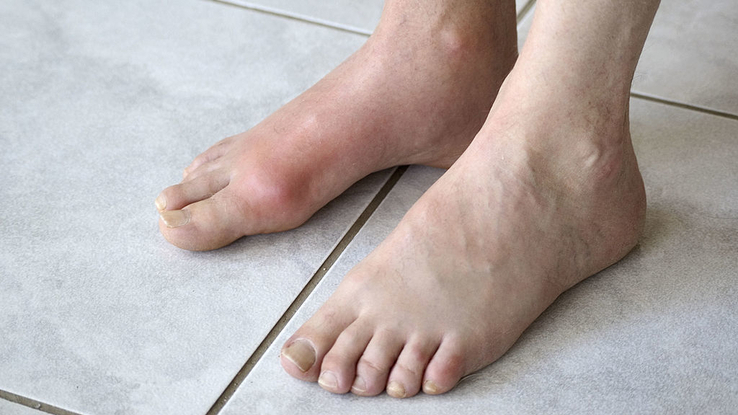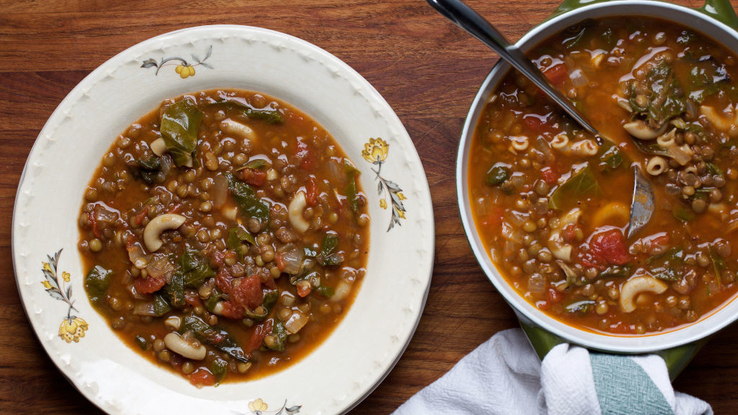Why Did English Use Beef for Gout

Gout is a form of inflammatory arthritis that usually occurs in the knees and the joints of fingers and toes. The condition causes intense tenderness in the affected area — even contact with your bedsheets can cause extreme pain during a flare up. Symptoms can come and go, but when they do appear, they usually do so quickly.
Although gout can be painful and inconvenient, it's also manageable. In addition to exercise and the avoidance of certain medications, you can prevent gout from acting up by making changes to your diet. Certain foods and drinks are more likely to cause or even prevent gout, and knowing how they interact with your condition and body is the first step to ensuring gout doesn't keep you from living the life you want.
What Causes Gout?
Gout is caused by the buildup of uric acid in the joints, which in turn come from the breakdown of purines — substances that naturally occur both in the body and in the food we eat. Your body needs a certain amount of uric acid to function, which is why your kidneys produce it. However, when your kidneys either over- or underproduce the acid, it can end up crystalizing in the body's tissues, fluids and joints, which is what causes the pain of gout.

Managing the uric acid in your body can be difficult, as only around 30 percent of the uric acid in your blood comes from food. Even so, by managing the number of purines that enter your body through food, you can still make a significant impact on your uric acid levels and decrease symptoms. Combined with exercise and other measures, you can get gout under control.
Foods to Eat and Avoid
Certain foods are more likely to contain purines, with red meat being notoriously bad in that regard. However, any meat that is high in fat content or comes from the organs of an animal tends to be high in purines. The same is also true of many kinds of seafood, such as sardines, trout and scallops; dairy products, especially fatty ones; and foods that are high in fructose, or sugar.

So what should you eat instead? Fruits, vegetables and whole grains are great, although you should avoid eating too many extra-sweet fruits due to their sugar content. While more exotic kinds of poultry, such as goose or pheasant, tend to be high in purines, chicken, turkey and duck can be eaten in moderation without provoking a case of gout, as can some kinds of seafood.
Gout-Friendly Drinks
As with food, some drinks are also better than others when it comes to containing gout. Staying hydrated in general can help with gout, so it's important to drink water throughout the day. Drinks that contain vitamin C are also a good choice, although because many kinds of juice are high in sugar, you may be better off taking a supplement instead. And fortunately for people who hate mornings everywhere, tea and coffee are both in the clear. The latter is not only not bad for gout, but it may even help prevent it — the caffeinated kind, at least. Just be sure to go easy on the cream and sugar, as both are bad for gout.

Speaking of drinks you should avoid, anything containing high-fructose corn syrup or other non-diet sweeteners is a poor choice for people with gout. Alcohol should also be avoided, as the body converts it into sugar during digestion. If you do decide to drink, wine is less likely to aggravate gout.
Other Ways to Treat Gout
While dietary changes can help with gout, you'll generally need more than that to fully treat the condition. Treating conditions associated with gout, such as high blood pressure, diabetes, kidney disease, congestive heart failure and especially obesity can also have a positive impact on gout. Exercise and weight loss are some of the best ways to prevent gout long-term, although if you already have it, you should avoid losing weight too quickly, as that can cause a spike in purines.

Some medications can make gout worse, while anti-inflammatory drugs can help treat the symptoms. You may also be more vulnerable to gout if it runs in your family or you recently underwent surgery or experienced physical trauma.
Resource Links:
https://www.mayoclinic.org/healthy-lifestyle/nutrition-and-healthy-eating/in-depth/gout-diet/art-20048524
http://blog.arthritis.org/gout/best-meat-for-gout-diet/
https://www.cdc.gov/arthritis/basics/gout.html
https://www.mayoclinic.org/diseases-conditions/gout/symptoms-causes/syc-20372897
Source: https://www.symptomfind.com/nutrition-supplements/the-best-foods-gout-sufferers?utm_content=params%3Ao%3D740013%26ad%3DdirN%26qo%3DserpIndex
0 Response to "Why Did English Use Beef for Gout"
Post a Comment